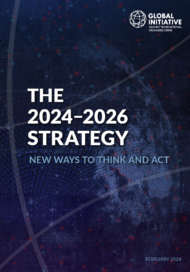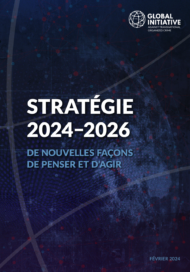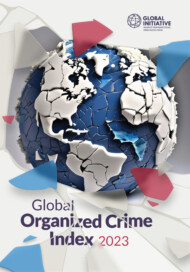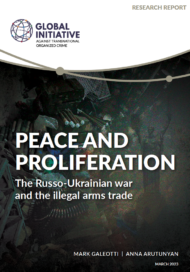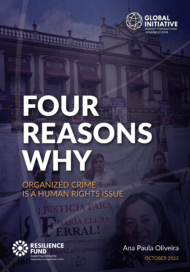The world is facing a number of serious and often interlinked threats and challenges, including violent conflicts, climate change, growing inequality, the impact of rapid technological innovation and mass migration. Organized crime cuts across all of these issues: it is either an enabler of these trends or profits from them. It grows in the cracks of our fractured world.
For example, criminals traffic weapons into or out of conflict zones from Afghanistan to Ukraine, and from the Democratic Republic of Congo to Sudan. Criminal groups are increasingly being used as a tool of statecraft to undermine opponents, prop up or topple governments, or carry out hybrid or proxy warfare. They are contributing to the destruction of our natural environment through illegal logging, overfishing and the illegal dumping of waste. They prey on the poor through extortion or by luring victims into human trafficking. Through ‘organized corruption’, state-embedded criminal actors are using all possible means to hang on to power and dole out patronage at the expense of public resources and institutions. Furthermore, criminals are quick to adapt to the latest technology, harnessing ransomware and artificial intelligence, or moving money or sending messages using encryption.
The latest edition of the Global Organized Crime Index (2023) reveals that greater attention must be devoted to addressing financial crime – now ranked as the biggest criminal market in the world. Furthermore, it is vital to identify and disrupt the role of professional facilitators in the private and public sectors who are at the interface of illicit and licit markets.
In short, there is a continued and urgent need for research and action around organized crime to promote new thinking and responses to understand criminal markets, actors and the ecosystems that enable them and to strengthen community resilience and trans-border cooperation. This is not a fringe issue; it goes to the heart of enhancing international peace and security, promoting sustainable development, improving governance of the global commons, reducing the impact of environmental degradation and enhancing multilateral cooperation (for example in the context of the Summit of the Future).
Subscribe to our mailing list and receive our open-source publications, tools, articles, events, and project updates via email every month.
El mundo se enfrenta a una serie de amenazas y retos graves y a menudo interrelacionados, como los conflictos violentos, el cambio climático, la creciente desigualdad, los efectos de la rápida innovación tecnológica y las migraciones masivas. El crimen organizado es transversal a todos estos problemas: o bien propicia estas tendencias, o bien se beneficia de ellas. Crece en las grietas de nuestro mundo fracturado.
Por ejemplo, el crimen organizado trafica armas hacia o desde zonas de conflicto, desde Afganistán hasta Ucrania, y desde la República Democrática del Congo hasta Sudán. Los grupos del crimen organizado se utilizan cada vez más como instrumento del Estado para debilitar a sus oponentes, para legitimar o destituir Gobiernos, o para llevar a cabo guerras híbridas o indirectas. Estos grupos contribuyen a la destrucción del medioambiente mediante la tala ilegal, la sobrepesca y el vertido ilegal de residuos. Se aprovechan de los sectores más marginados de la sociedad mediante la extorsión o atrayendo a víctimas para la trata de personas. A través de la corrupción organizada, los actores criminales integrados en el Estado utilizan todos los medios posibles para aferrarse al poder y repartir clientelismo a costa de los recursos y las instituciones públicos. Además, los grupos criminales se adaptan rápidamente a las últimas tecnologías, aprovechando el ransomware (programas de chantaje) y la inteligencia artificial, o moviendo dinero o enviando mensajes usando programas de encriptación.
La última edición del Índice global de crimen organizado (2023) señala que debe prestarse mayor atención a la lucha contra la delincuencia financiera, considerada actualmente el mayor mercado criminal del mundo. Además, es vital identificar y desarticular el papel de los facilitadores profesionales de los sectores privado y público que se encuentran en la intersección de los mercados ilícitos y lícitos.
En resumen, existe una necesidad continua y urgente de investigación y acción en torno al crimen organizado para promover nuevas ideas y respuestas que permitan comprender los mercados criminales, los actores y los ecosistemas que los posibilitan y reforzar la resiliencia comunitaria y la cooperación transfronteriza. No se trata de una cuestión marginal, sino que afecta directamente a la construcción de paz y seguridad internacionales, a la promoción del desarrollo sostenible, a la mejora de la gobernanza de los bienes comunes mundiales, a la reducción de los efectos de la degradación medioambiental y a la mejora de la cooperación multilateral (por ejemplo, en el contexto de la Cumbre del Futuro de las Naciones Unidas).
Suscríbete a nuestra lista de correo y recibe nuestras publicaciones, herramientas, artículos, eventos y actualizaciones de proyectos cada mes.
